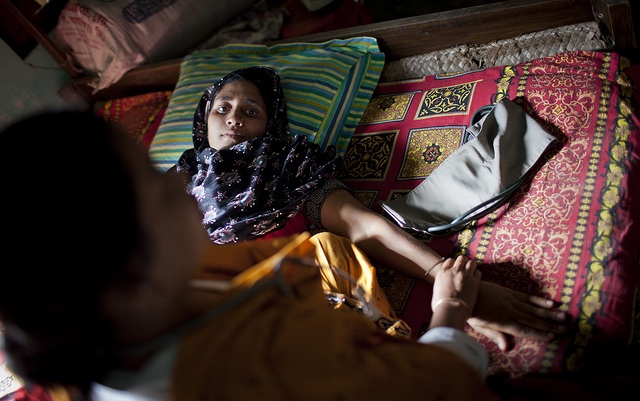As family planning practices and maternal health resources help to empower more women, health outcomes often improve for both mothers and babies. Despite a surge in robust maternal services in Bangladesh, though, the country remains among the top ten worldwide with the highest number of adolescent pregnancies both in per capita and absolute terms. Our research has found these adolescents and their infants are often more at risk for health complications than adult mothers, and indicates some aspects of these programs may require re-evaluation.
In Bangladesh, the non-governmental organization BRAC offers widespread maternal, newborn, and child health services, including prenatal care. BRAC workers provide nutrition education, supplements, counseling, and other medical services to women, primarily in rural areas. This outreach is designed to improve quality of life from the very start, preparing women with a better knowledge base for nutrition and infant feeding practices, and with material resources like iron folic-acid supplements.
But our research shows even when pregnant adolescents are accessing these services, they and their infants benefit less than adult mothers do.
Health impacts
Enabling an adolescent to achieve better current and future health through prevention is vital for her longer-term quality of life and productivity. Adolescent pregnancy poses many potential health problems, including greater risks of anemia, low birth weight or premature birth, and maternal and neonatal mortality. It also has social consequences, often disempowering young girls and encouraging early school dropout. This reality hits young mothers hard, often locking them into poverty or poor health.
Interviews comparing adult and adolescent mothers in BRAC program areas in Bangladesh show that adolescents recovered more slowly after giving birth, finding themselves incapable of proper infant care and self-care for a longer period of time on average. Overall, adolescent mothers face greater obstacles in caring for themselves, fulfilling their children’s needs, and taking care of other everyday tasks.
Further, despite similar uptake of BRAC’s prenatal care, adolescents were less knowledgeable about the benefits of consuming calcium and following good dietary practices than their adult counterparts. Adolescent women also had less autonomy, translating to less decision-making power in terms of food purchasing. It follows that low body mass index is much more common among adolescent mothers than adults.
These problems are require special attention because of the heightened importance of nutrition during adolescence. A pregnant adolescent’s body places competing, urgent demands on her dietary intake, which must sustain both her own growth and that of her unborn child.
For this reason, infants are also affected when their mothers are adolescents. Those infants had lower birth weights on average, were more likely to be malnourished, and were more vulnerable to infections.
Younger mothers at risk
Despite BRAC’s high performing program for provision of services for maternal health, younger mothers interviewed were less likely to practice the beneficial nutrition practices the program promotes, including measuring weight gain and proper supplementation practices. This may reflect a need for better methods of effecting behavior change, as well as for additiional resources such as free supplements.
Interventions such as nutrition education, food security policies, provision of supplements, and family planning can certainly keep adolescents healthier. Understanding how pregnant adolescents access such health programs is also key, however, to find ways to better suit their needs. If younger mothers access these services yet remain unable to adequately care for themselves or their children, enhanced approaches that also engage their families are urgently needed.
The nutrition of adolescent girls and young women has been under-prioritized in all regions of the world, and there is an urgent need to fill knowledge gaps in how best to address adolescent nutrition. Understanding how to effectively address the nutritional challenges that adolescent mothers face is crucial aspect of this goal. Empowering young women to live full and productive lives necessarily means making sure that pregnancies are safe and healthy.
Based on the experience of many young women in Bangladesh, perhaps the most important goal is improving family planning and education to prevent adolescent pregnancies in the first place. Once the complicated risks of adolescent pregnancies are clearly established, the path ahead becomes clear: Work to reduce pregnancies in younger women, and provide better and more accessible health and nutrition services for all.
Purnima Menon is a Senior Research Fellow and Phuong Hong Nguyen is a Research Fellow, both with IFPRI’s Poverty, Health, and Nutrition Division.







